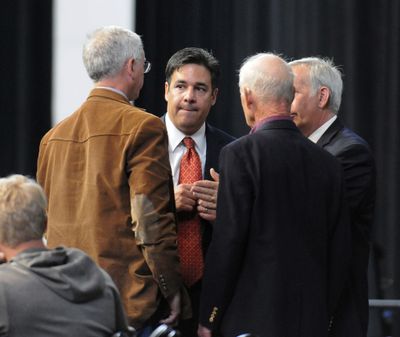Idaho’s GOP convention adjourns without electing chairman, setting platform

Idaho’s state Republican Party convention degenerated into a fiasco Saturday after attempts to disqualify up to a third of the delegates attending appeared to be succeeding – and the convention adjourned without electing a chairman, setting a platform or doing any of its scheduled business.
“For three weeks I’ve tried to broker a deal to prevent what happened today,” 1st District Idaho Congressman Raul Labrador told Idaho Public Television just after the convention adjourned. Labrador was the convention chairman and wants to be the next Majority Leader of the U.S. House.
“It’s hard to blame all this on Raul Labrador, but on the other hand, this does not strengthen his credentials for a national leadership position, either,” said BSU professor emeritus Jim Weatherby, a longtime observer of Idaho politics.
Far from uniting the deeply divided party, the gathering in Moscow deteriorated into dysfunction – though the GOP holds every statewide office in Idaho, every seat in the congressional delegation and more than 80 percent of the seats in the state Legislature. The outcome wasn’t promising for Labrador, whom many looked to as the healer for the fractured party just a day after he announced that he’s running for Majority Leader of the U.S. House. Instead, he ended the convention facing jeers and walkouts from his own party members.
Weatherby said the only comparable event he could think of was Nevada’s GOP convention fiasco in 2008, which was canceled before delegates to the national convention had been selected.
“And again, Ron Paul forces or libertarian forces were involved in that fiasco as well,” Weatherby said.
Although they experienced success in North Idaho races, libertarian and tea party forces lost badly in most parts of the state in the May 20 GOP primary. But they geared up to keep control of the party at the state convention.
Sen. Chuck Winder, R-Boise, sharply criticized an attempt at the convention to disqualify the entire delegations from three counties.
“It was basically the ultra-, ultra-conservative, tea party-libertarian type people basically flexing their muscle in the way the thing was organized,” said Winder, the state Senate assistant majority leader. “It’s a real shame that a convention comes to that stage, where there really wasn’t any real floor leadership, there wasn’t any fairness in the process, either in the credentials committee or on the floor. It was all pre-determined. It’s kind of ‘who’s going to have the power,’ rather than working together.”
State Sen. Bob Nonini, R-Coeur d’Alene, made the motion to adjourn at 3 p.m. Saturday. A vote challenging the move failed, as many delegates walked out.
“Both sides were just so fed up – they were done,” said Melissa Davlin, an Idaho Public Television reporter who was in Moscow covering the event. “They had been through hours of parliamentary procedures and confusion over rules and all of these things, and they still weren’t getting anywhere.”
The failure of the convention means that a full day of discussion Friday over resolutions, rules and platform planks was for naught. Committees had recommended resolutions to repeal Idaho’s state health insurance exchange, encourage Bible study in public schools and oppose Common Core state standards for student achievement, among others.
The platform committee had agreed on one major change in the state party platform: Doing away with its current clause calling for repeal of the 17th Amendment to the U.S. Constitution, which requires direct election of U.S. senators, and handing the power to pick senators back to state legislatures.
“Idahoans want their voices to be heard,” said Rep. Brandon Hixon, R-Caldwell, who made the motion in the committee to remove the plank. “I can’t imagine taking the voting power away from all 1.6 million people in Idaho and giving it to just 105 people in the Idaho Legislature to elect our United States senators.”
However, that plank will now stay in the state GOP platform for the next two years.
Current party Chairman Barry Peterson, who is aligned with the libertarian-tea party wing, will stay in office unless it’s determined that his term has expired; if so, the state central committee could name a replacement. “I heard people on both sides say that this is the last time they’re going to come to a state convention,” Davlin said.